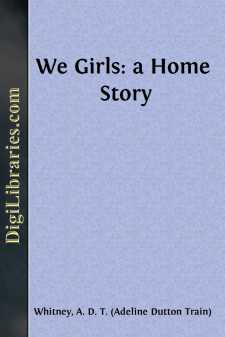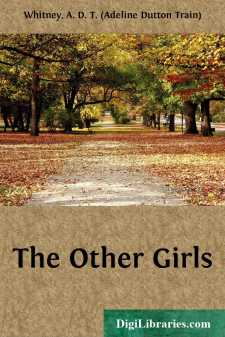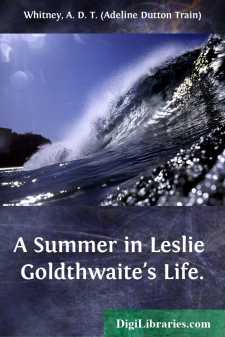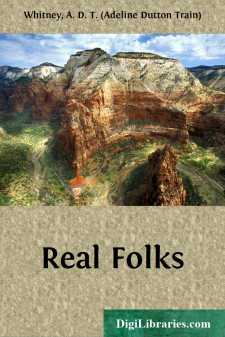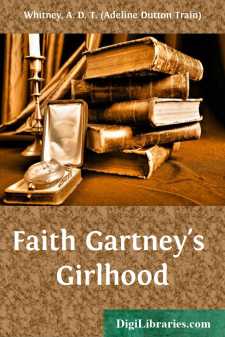Categories
- Antiques & Collectibles 13
- Architecture 36
- Art 48
- Bibles 22
- Biography & Autobiography 813
- Body, Mind & Spirit 142
- Business & Economics 28
- Children's Books 17
- Children's Fiction 14
- Computers 4
- Cooking 94
- Crafts & Hobbies 4
- Drama 346
- Education 46
- Family & Relationships 57
- Fiction 11829
- Games 19
- Gardening 17
- Health & Fitness 34
- History 1377
- House & Home 1
- Humor 147
- Juvenile Fiction 1873
- Juvenile Nonfiction 202
- Language Arts & Disciplines 88
- Law 16
- Literary Collections 686
- Literary Criticism 179
- Mathematics 13
- Medical 41
- Music 40
- Nature 179
- Non-Classifiable 1768
- Performing Arts 7
- Periodicals 1453
- Philosophy 64
- Photography 2
- Poetry 896
- Political Science 203
- Psychology 42
- Reference 154
- Religion 513
- Science 126
- Self-Help 84
- Social Science 81
- Sports & Recreation 34
- Study Aids 3
- Technology & Engineering 59
- Transportation 23
- Travel 463
- True Crime 29
We Girls: a Home Story
Description:
Excerpt
CHAPTER I.
THE STORY BEGINS.
It begins right in the middle; but a story must begin somewhere.
The town is down below the hill.
It lies in the hollow, and stretches on till it runs against another hill, over opposite; up which it goes a little way before it can stop itself, just as it does on this side.
It is no matter for the name of the town. It is a good, large country town,—in fact, it has some time since come under city regulations,—thinking sufficiently well of itself, and, for that which it lacks, only twenty miles from the metropolis.
Up our hill straggle the more ambitious houses, that have shaken off the dust from their feet, or their foundations, and surrounded themselves with green grass, and are shaded with trees, and are called "places." There are the Marchbanks places, and the "Haddens," and the old Pennington place. At these houses they dine at five o'clock, when the great city bankers and merchants come home in the afternoon train; down in the town, where people keep shops, or doctors' or lawyers' offices, or manage the Bank, and where the manufactories are, they eat at one, and have long afternoons; and the schools keep twice a day.
We lived in the town—that is, Mr. and Mrs. Holabird did, and their children, for such length of the time as their ages allowed—for nineteen years; and then we moved to Westover, and this story began.
They called it "Westover," more or less, years and years before; when there were no houses up the hill at all; only farm lands and pastures, and a turnpike road running straight up one side and down the other, in the sun. When anybody had need to climb over the crown, to get to the fields on this side, they called it "going west over"; and so came the name.
We always thought it was a pretty, sunsetty name; but it isn't considered quite so fine to have a house here as to have it below the brow. When you get up sufficiently high, in any sense, you begin to go down again. Or is it that people can't be distinctively genteel, if they get so far away from the common as no longer to well overlook it?
Grandfather Holabird—old Mr. Rufus,—I don't say whether he was my grandfather or not, for it doesn't matter which Holabird tells this story, or whether it is a Holabird at all—bought land here ever so many years ago, and built a large, plain, roomy house; and here the boys grew up,—Roderick and Rufus and Stephen and John.
Roderick went into the manufactory with his father,—who had himself come up from being a workman to being owner,—and learned the business, and made money, and married a Miss Bragdowne from C——, and lived on at home. Rufus married and went away, and died when he was yet a young man. His wife went home to her family, and there were no little children. John lives in New York, and has two sons and three daughters.
There are of us—Stephen Holabird's family—just six. Stephen and his wife, Rosamond and Barbara and little Stephen and Ruth. Ruth is Mrs. Holabird's niece, and Mr. Holabird's second cousin; for two cousins married two sisters....


